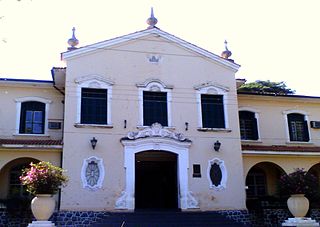
Ribeirão Preto is a municipality and a metropolitan area located in the northeastern region of São Paulo state, Brazil.

The University of São Paulo is a public university in the Brazilian state of São Paulo. It is the largest Brazilian public university and the country's most prestigious educational institution, the best university in Ibero-America, and holds a high reputation among world universities, being ranked 100 worldwide in reputation by the Times Higher Education World University Rankings. USP is involved in teaching, research and university extension in all areas of knowledge, offering a broad range of courses.
Maurício Oscar da Rocha e Silva was a Brazilian physician, biomedical scientist and pharmacologist. He discovered bradykinin, an endogenous polypeptide involved in the physiology, pharmacology and pathology of blood pressure control and many other phenomena related to the contraction of smooth muscles.

Faculdade de Medicina de Ribeirão Preto is a medical school of the University of São Paulo (USP) located in the city of Ribeirão Preto, state of São Paulo, Brazil, founded in 1952. It is considered one of the three best medical schools in the country and a premier medical research center.
Eduardo Moacyr Krieger is a Brazilian physician, physiologist and scientific leader, current president of the Brazilian Academy of Sciences.

Antonio Palocci Filho is a Brazilian physician and politician, and formerly Chief of Staff of Brazil under President Dilma Rousseff. He was the finance minister of the Brazilian federal government from 1 January 2003 to 27 March 2006, when he resigned in the wake of reports of conduct unbecoming of his office during the presidency of Luiz Inácio Lula da Silva. He resigned as Chief of Staff on 7 June 2011.
Zeferino Vaz led the construction, establishment and development of the Unicamp university, in the interior of the State of São Paulo, Brazil in the 1960s and 1970s. The main campus is named after Zeferino, who strived to bring together some of Brazil's best scientists to form a recognised research institution.
Manoel Bergström Lourenço Filho was a Brazilian educator and education theorist.

Henrique da Rocha Lima was a Brazilian physician, pathologist and infectologist born in Rio de Janeiro. With his friend, Stanislaus von Prowazek, he described what would later be known as Rickettsia prowazekii, the pathogen of epidemic typhus. Rocha Lima named the organism after Prowazek and American bacteriologist Howard Taylor Ricketts (1871-1910).

The Faculdade de Filosofia, Ciências e Letras de Ribeirão Preto, is a liberal arts college of the University of São Paulo campus at Ribeirão Preto, São Paulo, Brazil. It was created in 1959, and incorporated into the University in 1974.

Botafogo Futebol Clube, commonly referred to as Botafogo-SP or simply Botafogo, is a Brazilian association football club in Ribeirão Preto, São Paulo. They currently play in the Série C, the third tier of Brazilian football, as well as in the Campeonato Paulista Série A1, the top tier of the São Paulo state football league.
Renato Helios Migliorini was a Brazilian physician, biomedical scientist, biochemist and full professor of physiology at the Medical School of Ribeirão Preto of the University of São Paulo.
Gilberto De Nucci is a noted Brazilian physician, scientist and university professor in the field of pharmacology.

Marco Antonio Zago is a Brazilian physician and prominent medical scientist, who is active in the fields of hereditary diseases of the blood, molecular basis of cancer and human population genetics. Since 2007 he is also the president of the Brazilian National Research Council (CNPq).

The Hospital das Clínicas de Ribeirão Preto is a teaching hospital located in the city of Ribeirão Preto, state of São Paulo, Brazil. It is affiliated to the Medical School of Ribeirão Preto.
José Moura Gonçalves (1914–1995), Brazilian physician, biomedical scientist, biochemist and educator, one of the pioneers of biochemistry in the country.

Rodovia Attilio Balbo is a highway in the state of São Paulo), Brazil, which starts in the city of Ribeirão Preto and finishes at the city of Bebedouro. Two other important cities served by the highway are Sertãozinho and Jaboticabal. The name of its first stretch, between Ribeirão Preto and Sertãozinho, honors Italian Brazilian Attilio Balbo, a pioneer farmer and industrialist in the area of sugarcane, sugar and alcohol. The second stretch, from Sertãozinho to Bebedouro, has been named after Armando Salles de Oliveira, a former state governor of São Paulo.
Lewis Joel Greene is an American Brazilian biochemist, scientist, university professor and editor of the Brazilian Journal of Medical and Biological Research.

The Roman Catholic Archdiocese of Ribeirão Preto is an archdiocese located in the city of Ribeirão Preto in Brazil.

Maria Carmela Lico or Licco (1927–1985) spent most of her research life as a physiologist studying the neural mechanisms of pain at the Department of Physiology of the Faculdade de Medicina de Ribeirão Preto (Brazil). Lico produced important insights on the descending control of nociception by limbic structures, specially the septal nuclei.












